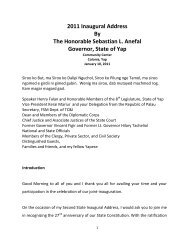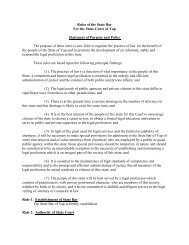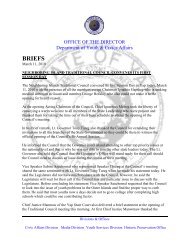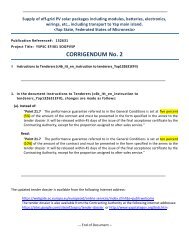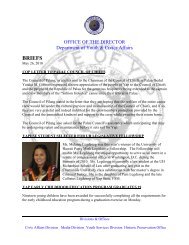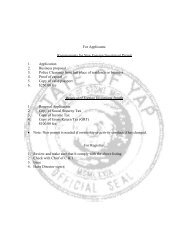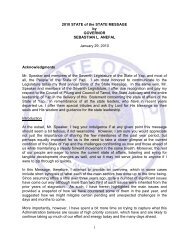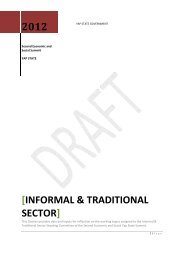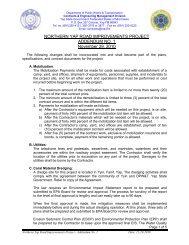RULES OF CIVIL PROCEDURE For the Trial Division of the Yap ...
RULES OF CIVIL PROCEDURE For the Trial Division of the Yap ...
RULES OF CIVIL PROCEDURE For the Trial Division of the Yap ...
Create successful ePaper yourself
Turn your PDF publications into a flip-book with our unique Google optimized e-Paper software.
VII. JUDGMENT<br />
Rule 54. Judgments; Costs.<br />
(a) Definition; <strong>For</strong>m. "Judgment" as used in <strong>the</strong>se rules includes a decree and any<br />
order from which an appeal lies. A judgment shall not contain a recital <strong>of</strong> pleadings, <strong>the</strong><br />
report <strong>of</strong> a master, or <strong>the</strong> record <strong>of</strong> prior proceedings.<br />
(b) Judgment Upon Multiple Claims or Involving Multiple Parties. When more than<br />
one claim for relief is presented in an action, whe<strong>the</strong>r as a claim, counterclaim,<br />
crossclaim, or third party claim, or when multiple parties are involved, <strong>the</strong> court may<br />
direct <strong>the</strong> entry <strong>of</strong> a final judgment as to one or more but fewer than all <strong>of</strong> <strong>the</strong> claims or<br />
parties only upon an express determination that <strong>the</strong>re is no just reason for delay and upon<br />
an express direction for <strong>the</strong> entry <strong>of</strong> judgment. In <strong>the</strong> absence <strong>of</strong> such determination and<br />
direction, any order or o<strong>the</strong>r form <strong>of</strong> decision, however designated, which adjudicates<br />
fewer than all <strong>the</strong> claims or <strong>the</strong> rights and liabilities <strong>of</strong> fewer than all <strong>the</strong> parties shall not<br />
terminate <strong>the</strong> action as to any <strong>of</strong> <strong>the</strong> claims or parties, and <strong>the</strong> order or o<strong>the</strong>r form <strong>of</strong><br />
decision is subject to revision at any time before <strong>the</strong> entry <strong>of</strong> judgment adjudicating all<br />
<strong>the</strong> claims and <strong>the</strong> rights and liabilities <strong>of</strong> all <strong>the</strong> parties.<br />
(c) Demand for Judgment. A judgment by default shall not be different in kind from<br />
or exceed in amount that prayed for in <strong>the</strong> demand for judgment. Except as to a party<br />
against whom a judgment is entered by default, every final judgment shall grant <strong>the</strong> relief<br />
to which <strong>the</strong> party in whose favor it is rendered is entitled, even if <strong>the</strong> party has not<br />
demanded such relief in his pleadings.<br />
(d) Costs. Except when express provision <strong>the</strong>refor is made ei<strong>the</strong>r in a statute <strong>of</strong> <strong>the</strong><br />
State <strong>of</strong> <strong>Yap</strong> or in <strong>the</strong>se rules, costs shall be allowed as <strong>of</strong> course to <strong>the</strong> prevailing party<br />
unless <strong>the</strong> court o<strong>the</strong>rwise directs; but costs against <strong>the</strong> State <strong>of</strong> <strong>Yap</strong>, its <strong>of</strong>ficers, and<br />
agencies shall be imposed only to <strong>the</strong> extent permitted by law. Costs may be taxed by <strong>the</strong><br />
clerk on one day's notice. On motion served within 5 days <strong>the</strong>reafter, <strong>the</strong> action <strong>of</strong> <strong>the</strong><br />
clerk may be reviewed by <strong>the</strong> court.<br />
Rule 55. Default.<br />
(a) Entry. When a party against whom a judgment for affirmative relief is sought has<br />
failed to plead or o<strong>the</strong>rwise defend as provided by <strong>the</strong>se rules and that fact is made to<br />
appear by affidavit or o<strong>the</strong>rwise, <strong>the</strong> court shall enter his default. No default shall be<br />
entered until <strong>the</strong> expiration <strong>of</strong> at least 30 days after service.<br />
(b) Judgment. Judgment by default may be entered as follows:<br />
(1) <strong>For</strong> a Sum Certain. When <strong>the</strong> plaintiff's claim against a defendant is for a sum<br />
certain or for a sum which can by computation be made certain, <strong>the</strong> court upon request <strong>of</strong><br />
<strong>the</strong> plaintiff and upon affidavit <strong>of</strong> <strong>the</strong> amount due shall enter judgment for that amount<br />
and costs against <strong>the</strong> defendant, if he has been defaulted for failure to appear and if he is<br />
not an infant or incompetent person.



